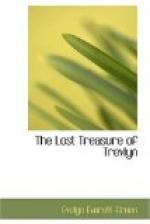For two long weeks the family at the Chase lived upon tenterhooks. Every day they feared to hear the approach of some messenger with tidings of woe. There was terror in many hearts when a loud explosion in the middle of the night roused them all from their beds; but it was quickly seen that this explosion did not immediately concern them, and that it must have proceeded from the old Gate House, which was already wrapped in flames. The servants hurried down to assist, but were too late. It was only many hours later that the charred remains of what had once been two human beings were found amongst the smoking ruins. A whisper went abroad that a certain well-known seminary priest, by name Father Urban, had fled from London, and had taken refuge with Nicholas Trevlyn. It was surmised that the two must have been preparing themselves for a siege, and that their ammunition had unexpectedly ignited and caused the catastrophe.
To say that any one deplored the fate of the gloomy old man, who was supposed to be little better than a maniac, would be going altogether too far. Petronella shed a few tears, but they were tears rather of relief than of sorrow; while Sir Richard felt that he could breathe more freely when his contumacious kinsman had ceased to live at his door.
The whisper which had alarmed his friends died a natural death so soon as the real facts connected with the plot came to be known, and the number and names of the true conspirators discovered. Indeed, further inquiry appeared to elicit the fact that Cuthbert Trevlyn had been striving to unravel and expose the plot, and that he had been shot down by one of the genuine plotters as a spy and a foe. As he had not since been seen or heard of, considerable anxiety was felt in some quarters for his safety. Sir Richard was causing inquiries to be made in London. Cherry was beginning to go about looking pale and hollow eyed. Lady Humbert, who always cheerily avowed that everything would come right in time, was secretly not a little anxious, until a few days before the Yuletide season, when she was called out into her own back regions to interview a strange woman who was asking for her, and found herself face to face with Joanna, the gipsy queen.
For a moment she scarcely knew the woman again, for she had put off her distinctive dress, and was habited like a simple countrywoman. Her face, too, had lost its brilliant colouring, and her eyes were softer than of yore. She told the astonished Lady Humbert that her mother Miriam was lately dead, that the tribe over whom she ruled had been dispersed and scattered she knew not whither, and that she had no wish to gather about her the remnants of the gipsy folk, who had long been more disposed to consort with robbers and outlaws than to submit to her sway. She was weary of the old life, and desired something more tranquil. She asked if she could serve Lady Humbert in the capacity of dairy woman or laundress, and was promptly answered in the affirmative.




